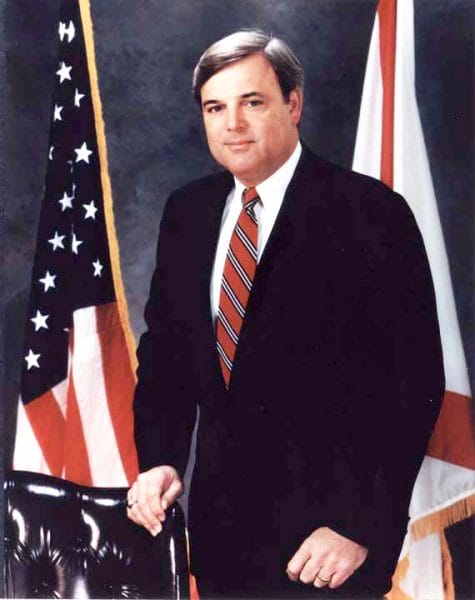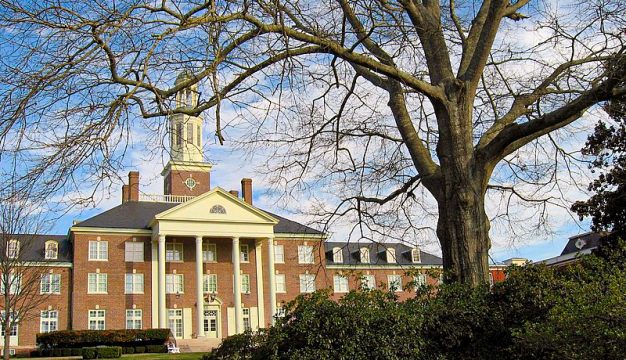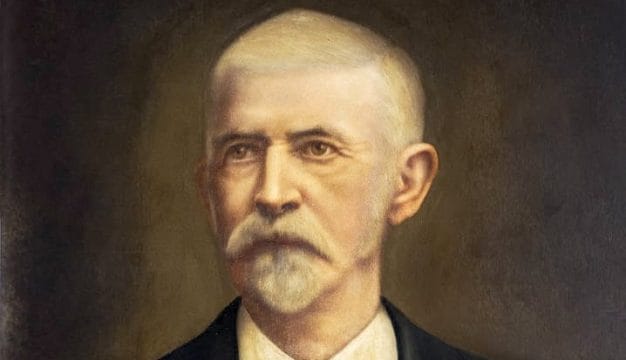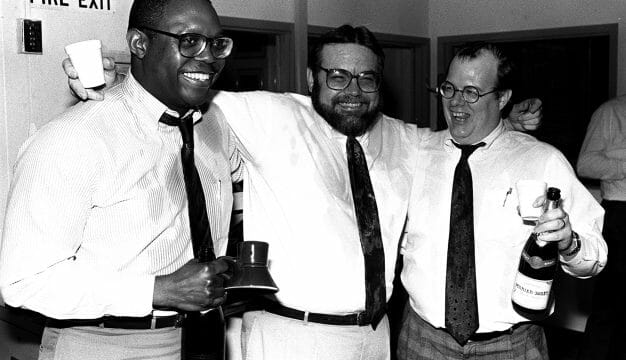James E. Folsom Jr. (1993-95)
James E. Folsom Jr. was Alabama's governor from 1993-95 and the only governor so far to assume that office as a result of the felony conviction of his predecessor. He is also one of two sets of fathers and sons who served as governors of Alabama, the other being Edward and Emmet O'Neal. Folsom is notable for his removal of the Confederate battle flag from the state capitol, and he appointed a number of African Americans and women to his staff. He also helped initiate the movement of the automotive industry to the Southeast when he helped bring a Mercedes-Benz plant to the state.
 James E. Folsom Jr.
Folsom was born in Montgomery on May 14, 1949, to Gov. James E. "Big Jim" Folsom Sr. and Folsom's second wife, Jamelle Dorothy Moore Folsom, during the elder Folsom's first term as governor. "Little Jim" began public school in Montgomery during his father's second term as Alabama's chief executive. When Big Jim left the governorship in 1959, the young Folsom transferred to the Cullman system and graduated from Cullman High School in 1967. He entered the University of Alabama but stayed there only one year and then joined the National Guard. In 1970, he entered Jacksonville State University, working at a local post office and yarn mill to help finance his way. He earned his degree from Jacksonville State in 1974. In 1977, he married Marsha Guthrie, daughter of a former Cullman state senator and close ally of Big Jim, with whom he had two children.
James E. Folsom Jr.
Folsom was born in Montgomery on May 14, 1949, to Gov. James E. "Big Jim" Folsom Sr. and Folsom's second wife, Jamelle Dorothy Moore Folsom, during the elder Folsom's first term as governor. "Little Jim" began public school in Montgomery during his father's second term as Alabama's chief executive. When Big Jim left the governorship in 1959, the young Folsom transferred to the Cullman system and graduated from Cullman High School in 1967. He entered the University of Alabama but stayed there only one year and then joined the National Guard. In 1970, he entered Jacksonville State University, working at a local post office and yarn mill to help finance his way. He earned his degree from Jacksonville State in 1974. In 1977, he married Marsha Guthrie, daughter of a former Cullman state senator and close ally of Big Jim, with whom he had two children.
Folsom's first job after college was with the Alabama Department of Industrial Relations, where he worked from 1974 to 1976. He then worked briefly as the southeastern public affairs representative for Reynolds Aluminum Company in Muscle Shoals. In 1976, he was defeated in his first political race, an ill-considered bid to unseat veteran congressman Tom Bevill in the Democratic primary. Two years later, Folsom launched a more realistic bid for public office when he ran successfully for a seat on the Alabama Public Service Commission. Midway through his first term, he took advantage of an opportunity to move quickly to a higher political office. The U.S. Senate seat formerly occupied by the late James B. Allen was held by Donald Stewart, whom Folsom correctly perceived to be vulnerable. He successfully challenged Stewart in the fall 1980 Democratic primary. In the November general election, however, Ronald Reagan was the Republican nominee, and state Republicans had nominated Adm. Jeremiah Denton, a former prisoner of war in North Vietnam, as their senatorial candidate. Reagan carried Alabama easily, and his affiliation helped Denton to defeat Folsom by a close margin.
Folsom continued to serve on the Public Service Commission and was reelected to a second term without difficulty in 1982. In the 1986 state elections, he ran successfully for the lieutenant governor's office. As a result of this election, both the new governor, Guy Hunt, and the lieutenant governor were from Cullman County. Folsom won with support from groups his father had long opposed, especially a group of conservative business people known as the Big Mules. Presiding over the Alabama Senate, he helped steer a limited tort-reform package through the legislature in 1987, but he did not attempt to dominate the upper chamber. He and Hunt were reelected to their posts in 1990, but circumstances changed dramatically for Folsom on April 22, 1993.
 Guy Hunt
On that date a Montgomery jury found Governor Hunt guilty of a felony violation of the state ethics act, causing his immediate removal from the governor's office. A few hours after the jury's verdict was rendered, Folsom took the oath of office as Alabama's 53rd governor. Six days later, the new governor ordered that the Confederate battle flag no longer be flown above the capitol dome when its renovations were completed. The controversial flag had been placed above the capitol in the early 1960s by Gov. John Patterson during the era of civil rights confrontations. Folsom drew praise and outrage for his directive. There was less notice taken by some as Folsom began to staff his administration with blacks and women in several key posts. In August 1993, Folsom called a special session of the legislature to consider ethics and campaign reform. The assembly passed only weak reform bills, which Folsom chose not to sign into law because they offered little improvement over existing laws.
Guy Hunt
On that date a Montgomery jury found Governor Hunt guilty of a felony violation of the state ethics act, causing his immediate removal from the governor's office. A few hours after the jury's verdict was rendered, Folsom took the oath of office as Alabama's 53rd governor. Six days later, the new governor ordered that the Confederate battle flag no longer be flown above the capitol dome when its renovations were completed. The controversial flag had been placed above the capitol in the early 1960s by Gov. John Patterson during the era of civil rights confrontations. Folsom drew praise and outrage for his directive. There was less notice taken by some as Folsom began to staff his administration with blacks and women in several key posts. In August 1993, Folsom called a special session of the legislature to consider ethics and campaign reform. The assembly passed only weak reform bills, which Folsom chose not to sign into law because they offered little improvement over existing laws.
In the area of education, Folsom made an effort to comply with two state court rulings that required adequate and equitable education for Alabama's schoolchildren. In June 1993, he named a task force that ultimately recommended an education reform plan that, if implemented, would have cost the state an estimated $1 billion annually. To the surprise of few, the governor could identify no politically expedient funding mechanisms to support this plan, although increased property taxes and gambling casinos, such as those in neighboring Mississippi, were suggested. Thus, no meaningful changes occurred in the state's education system. Folsom did successfully collaborate with another son of a famous governor, State Treasurer "Little George" Wallace, to provide a plan whereby Alabama parents could prepay college tuition at a great savings over the predicted real costs of four years at a state institution of higher learning.
 Mercedes-Benz Production Line
The brightest spot in Folsom's brief administration of one year, eight months, and 24 days occurred in September 1993, when Alabama landed the Mercedes-Benz automobile plant in a competition that included numerous states across the nation. In late summer, the legislature, at Folsom's urging, passed a financial incentive package that provided tax advantages to firms such as Mercedes. Folsom had travelled to Germany personally to woo Mercedes officials into selecting Vance, Tuscaloosa County, as the location for the $300 million sports-vehicle assembly plant that was expected to provide as many as 1,500 jobs for Alabama workers.
Mercedes-Benz Production Line
The brightest spot in Folsom's brief administration of one year, eight months, and 24 days occurred in September 1993, when Alabama landed the Mercedes-Benz automobile plant in a competition that included numerous states across the nation. In late summer, the legislature, at Folsom's urging, passed a financial incentive package that provided tax advantages to firms such as Mercedes. Folsom had travelled to Germany personally to woo Mercedes officials into selecting Vance, Tuscaloosa County, as the location for the $300 million sports-vehicle assembly plant that was expected to provide as many as 1,500 jobs for Alabama workers.
Folsom, like his predecessor Guy Hunt, was also the target of ethics complaints. While gambling legislation was under consideration in the state senate and Folsom was serving as lieutenant governor, he and his family flew to the Cayman Islands for a vacation on the personal jet of gambling magnate Milton McGregor. A lengthy investigation of this matter dragged on and no doubt had an effect on the outcome of the 1994 governor's race.
 Folsom Family
Folsom waged a vigorous campaign in the Democratic primary for a full term as governor in 1994. He won handily over his opponent, Alabama Education Association chief Paul Hubbert, and ran an equally vigorous campaign against Republican nominee Forrest "Fob" James. Most Alabamians seemed to be pleased with Folsom's performance in office, and he was expected to win. Helped by a national Republican landslide that gave the GOP control of both houses of Congress for the first time in 40 years, James narrowly won the governorship. The ethics investigation by the state attorney general's office ended without any charges being brought against Folsom, although several Folsom associates were convicted of improprieties. Early in 1998, U.S. attorney Redding Pitt, who had been looking into possible federal violations by Folsom, publicly stated that no federal criminal charges would be filed against the former governor. Folsom then called for an investigation of his accusers, specifically Governor James and former Republican attorney general Jeff Sessions, who had since been elected by Alabama voters to the U.S. Senate. Nothing came of his request.
Folsom Family
Folsom waged a vigorous campaign in the Democratic primary for a full term as governor in 1994. He won handily over his opponent, Alabama Education Association chief Paul Hubbert, and ran an equally vigorous campaign against Republican nominee Forrest "Fob" James. Most Alabamians seemed to be pleased with Folsom's performance in office, and he was expected to win. Helped by a national Republican landslide that gave the GOP control of both houses of Congress for the first time in 40 years, James narrowly won the governorship. The ethics investigation by the state attorney general's office ended without any charges being brought against Folsom, although several Folsom associates were convicted of improprieties. Early in 1998, U.S. attorney Redding Pitt, who had been looking into possible federal violations by Folsom, publicly stated that no federal criminal charges would be filed against the former governor. Folsom then called for an investigation of his accusers, specifically Governor James and former Republican attorney general Jeff Sessions, who had since been elected by Alabama voters to the U.S. Senate. Nothing came of his request.
Folsom and his family returned to private life in Cullman, where he was involved in an investment business. Folsom was returned to the office of lieutenant governor by Alabama voters in November 2006 and served until 2011. He was defeated in his efforts for reelection in 2010 by Republican nominee Kay Ivey. He explored running for governor in 2018 but ultimately chose not to enter the race.
Note: This entry was adapted with permission from Alabama Governors: A Political History of the State, edited by Samuel L. Webb and Margaret Armbrester (Tuscaloosa: University of Alabama Press, 2001).
Further Reading
- Mullaney, Marie M. Biographical Directory of the Governors of the United States, 1988-1994. Westport, Conn.: Greenwood Press, 1994.



